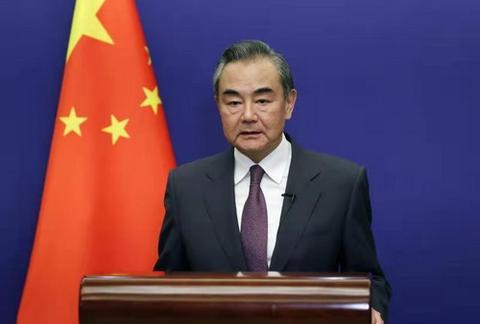Source: Overseas Network

On October 25, Chinese State Councilor and Foreign Minister Wang Yi delivered a video speech at the opening ceremony of the 17th Beijing-Tokyo Forum. (Photo/ Website of the Ministry of Foreign Affairs)
"We must practice true multilateralism, oppose the 'new Cold War' and 'small circles', work together to deal with global issues, and inject more positive energy into the world today." On October 25, Chinese State Councilor and Foreign Minister Wang Yi said in a video message at the opening ceremony of the 17th Beijing-Tokyo Forum. Against the backdrop of the 50th anniversary of the normalization of diplomatic relations between China and Japan, China's statement is not only a reminder to the new Japanese government, but also opens up a broader vision for Sino-Japanese relations.
Looking back on the lessons of the past year, the new Japanese government needs to listen to the will of the people and practice true multilateralism. During the Suga administration, Japan willingly became a strategic vassal of the United States, not only frequently pointing fingers at China's internal affairs such as Hong Kong,those involved in Xinjiang, and Taiwan, but also engaged in "small circles" and group politics in the Asia-Pacific region, mixing with the "Quad" of the United States, Japan, India, and Australia, and expressing support for the UNITED-Britain-Australia Trilateral Security Partnership (AUKUS). The Suga administration's "embrace" of the "small circle" and pseudo-multilateralism has not only led to the dwarfing of Japan's own image in the Asia-Pacific region, but also caused dissatisfaction among Japanese society. For example, according to the "China-Japan Public Opinion Survey" recently released by the China Foreign Language Bureau and the Japanese Speech NPO, 55.0% of Japanese respondents said that in the context of the intensification of the Sino-US game, Japan "should not" choose a side; a poll released by Japan's Kyodo News Agency on October 18 showed that 68.9% of respondents believe that the Kishida Fumio government "should not inherit" the line of the Abe Shinzo government and the Suga government. The new Kishida government needs to read the actual public opinion expectations behind the figures and take more practical measures to cut off from "small circles" and pseudo-multilateralism.
As important countries in the region and the world, both China and Japan have the obligation to defend multilateralism. 2021 marks the 50th anniversary of New China's restoration of its legitimate seat in the United Nations and the 65th anniversary of Japan's accession to the United Nations. As a defeated country in World War II, Japan was able to quickly recover its economy and quickly restart economic and trade exchanges with other countries and regions precisely based on multilateralism and free trade. From this perspective, it is in the interests of both sides for China and Japan to join hands in defending multilateralism. As the world's second and third largest economies, China and Japan clearly shoulder important responsibilities in resisting various forms of protectionism and unilateralism and safeguarding multilateralism and free trade.
Defending and practicing multilateralism should become a new direction for Sino-Japanese cooperation. Since the normalization of diplomatic relations in 1972, after nearly 50 years of development, great changes have taken place in both China and Japan and the international situation. If the cooperation between China and Japan in the past has been more concentrated at the bilateral level such as economy and trade, education, pensions, and medical care, then with the international balance of forces and the evolution of the international pattern, Sino-Japanese cooperation should move towards a broader level, focusing more on defending multilateralism, safeguarding free trade and other macroscopic areas. Through cooperation in the multilateral field, it will help inject new impetus into the future development of China-Japan relations, deepen political mutual trust between the two sides, and expand the scope of cooperation between the two countries.
In 2022, China and Japan will celebrate the 50th anniversary of the normalization of diplomatic relations. In the past 50 years, China-Japan relations have made great progress, and China and Japan have also made positive contributions to regional and world prosperity and stability. At present, the century of changes has evolved profoundly, the epidemic in the century has been delayed, and Sino-Japanese relations are facing key development nodes. In this special context, China and Japan should take the revitalization of Asia as a common goal, eliminate all kinds of external interference, devote themselves to safeguarding the overall situation of regional peace and stability, and jointly lead the process of regional cooperation and integration in Asia. (Chen Yang)
Overseas network copyright works shall not be reproduced without authorization.